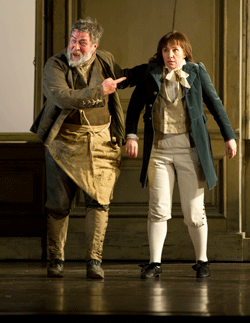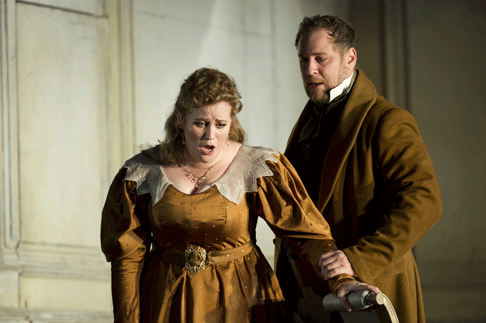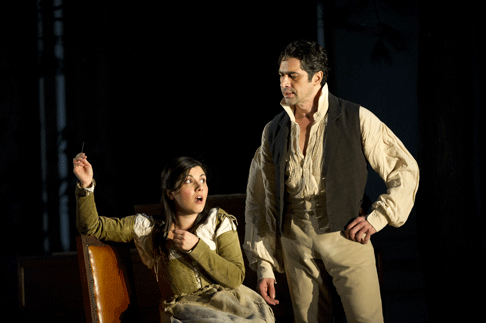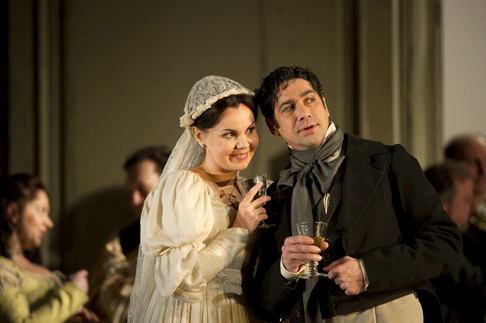15 Feb 2012
Le nozze di Figaro, Royal Opera
David McVicar’s production of The Marriage of Figaro, previously staged in 2006 (twice),

David McVicar’s production of The Marriage of Figaro, previously staged in 2006 (twice),
2008, and 2010, now returns as part of the Royal Opera House’s ‘Da Ponte cycle’. I cannot help wishing that funds had stretched to commissioning three new productions, preferably from the same director, with a sense of how the works might actually cohere as a ‘cycle’. Nevertheless, and despite a good number of reservations I continue to entertain, McVicar’s production remains preferable to Jonathan Miller’s vulgar Così fan tutte, and, assuming it not to have been overhauled beyond recognition, Francesca Zambello’s vacuous Don Giovanni.
 Anna Bonitatibus as Cherubino and Jeremy White as Antonio
Anna Bonitatibus as Cherubino and Jeremy White as Antonio
Moving the action to the 1820s does no Restoration period, but the motivation remains obscure. If the point be to highlight Talleyrand’s observation concerning the restored Bourbons, that they had learned nothing and forgotten nothing, then it needs to be made, not assumed. The Count’s droit de seigneur is a gross exaggeration in the eighteenth century; in the nineteenth, it merely seems incredible. ‘Absolutism’ was of course a nineteenth-century way of understanding the ancien régime, painting a complex society in the bold, often crude colours of monarchs such as Charles X. A good deal of sophistication would be needed to make the shift coherent, yet here the political seems notable for the most part by its absence. We have neither a society of orders nor an emergent class-based society, merely a house with hyperactive servants in attractive costumes. The result, whatever the intention, seems to be pandering to devotees of mindless ‘costume dramas’. It all nevertheless looks good, and certain moments are very well handled, especially the magical falling of dusk between the third and fourth acts. (Incidentally, when audience members are relentlessly intent upon disrupting the action with mid-act applause, why do they then fall silent at the end of an act? Mystifying!) The servants’ running about during the Overture remains an unnecessary irritant — can anyone really think that Mozart’s music deserves to be drowned out by footsteps? — and Leah Hausman’s revival direction, sadly, tends towards the Carry On school, only encouraging a vocal, puerile section of the audience, about which more anon.
 Lucas Meachem as Count Almaviva and Rachel Willis-Sorensen as Countess Almaviva
Lucas Meachem as Count Almaviva and Rachel Willis-Sorensen as Countess Almaviva
The greatest surprise of the evening was perhaps Sir Antonio Pappano’s conducting. There were problems: too often, he seems to view Mozart as aspiring towards Rossini, and the consequent motor rhythms have no place whatsoever in Mozart’s music. Certain aspects of phrasing also suffered in that respect, perhaps most glaringly in the Overture; articulation, where desperately needed, came there none. The use of natural horns was at best questionable; their rasping at the conclusion of Figaro’s fourth act aria was unpleasant in the extreme. That said, and with the notable exception of the end of the second act, Pappano did not harry the score; indeed, there were moments when he clearly communicated his delight in its subtleties. Woodwind might not have ravished in the way they did for Sir Colin Davis in 2010, but they seduced nevertheless. Tempi convinced for the most part, and there was little of the tendency towards mere ‘accompaniment’ that has often held back this conductor’s work previously. I seem to be the only person who regrets the ‘traditional’ cuts in the fourth act, but regret them I do.
Casting Figaro successfully seems trickier than one would expect. Even in 2010, a simply astounding male team of Erwin Schrott (Figaro) and Marius Kwiecien (the Count) had to endure sub-par contributions from their Susanna and Countess. Here the undoubted star was Aleksandra Kursak’s Susanna, ever musical, ever lively, and above all ever alert to the twists and turns Da Ponte and Mozart lovingly throw her way. One could not, for the duration of the performance, imagine it being done better any other way. Phrasing was telling but unobtrusive, likewise her sideways glances.
 Ildebrando D’Arcangelo as Figaro and Susana Gaspar as Barbarina
Ildebrando D’Arcangelo as Figaro and Susana Gaspar as Barbarina
Ildebrando d’Arcangelo has never lacked stage presence, and his voice at its dark-chocolate best remains as attractive as his handsome visage and figure. There were, however, a good few moments, especially earlier on, when his delivery lacked focus. Lucas Meachem’s Count suffered similarly, though he also lacked his valet’s presence — a serious drawback, alas. Rachel Willis-Sørensen’s Countess was a serious disappointment: I have never heard ‘Porgi, amor’ so ill-tuned, nor so squally. She improved as time went on, but throughout lacked grace and, straightforwardly, character. The Cherubino of Anna Bonatatibus also disappointed: ill-focused and short-breathed. Even the Marcellina of a stalwart such as Ann Murray, an artist I admire greatly, sometimes sounded out of sorts. And would directors please cease their fixation with turning Don Basilio into a camp monstrosity? It is entirely unwarranted in either libretto or score, and has simply become a tedious cliché.
Finally, alas, a character that was all too present on this occasion: the audience, or at least a considerable section thereof. I had been tempted to open with the words, ‘more in sorrow than in anger,’ but that would have misled, for both emotions ran to the surface dealing with so disruptive a crowd. All manner of disruption was present, unremittingly so. Barely a bar went by without a cough or two. Objects were dropped left, right, and centre — and I am not referring to the stage business. A watch alarm made a charming accompaniment to ‘Porgi, amor’, though we had to wait a little longer for telephones to make their first appearance. Worst of all was the incessant, moronic laughter, perhaps to a certain extent elicited by more dubious aspects of the production; but really, if one finds someone walking onstage with a dog intrinsically hilarious, then one may need to seek treatment.
 Alexandra Kurzak as Susanna and Ildebrando D’Arcangelo as Figaro
Alexandra Kurzak as Susanna and Ildebrando D’Arcangelo as Figaro
The slightest reference — via the surtitles, be it noted — to anything sexual was met with all the maturity of a convention for non-recovering Benny Hill Show addicts. I should say that those people needed to get out more, except I should much rather they stayed at home. Most unforgivable was the laughter that greeted those words: ‘Contessa, perdono’. McVicar’s production brings a true sense of revelation at that point, the show-stopping appearance of the Countess, ravishing and in more than one sense graceful, fully in tune with Mozart’s approaching benediction. What is even remotely hilarious about seeking a forgiveness that goes beyond even the humanity of the Countess to the Almighty Himself, that ‘peace … which passeth all understanding’? Even if somehow one were to find that hysterically amusing — presumably one would then guffaw through King Lear or the Missa Solemnis — one might have some regard for fellow members of the audience, those who might have come to hear Mozart’s score. As the gentleman seated next to me commented during the curtain calls, it made one long to be Ludwig II, alone with one’s art. None of this is, of course, in any sense the fault of the Royal Opera House, but perhaps an announcement requesting silence during performance and the occasional summary execution, pour encourager les autres, might be in order.
Mark Berry